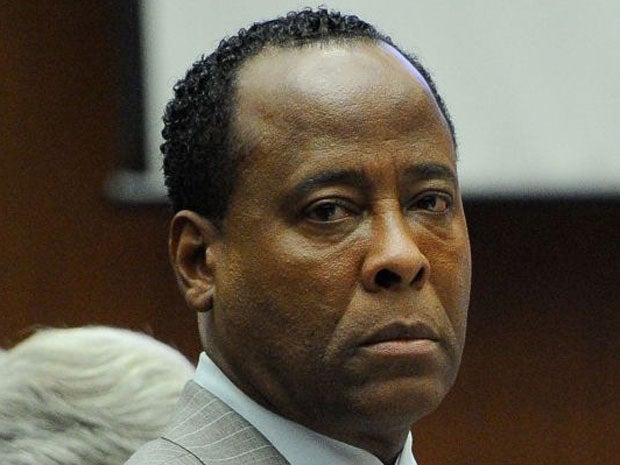Dr Conrad Murray's money problems were to blame for Michael Jackson's death, civil court hears

Jurors in the civil case between Michael Jackson's mother and concert giant AEG Live heard yesterday that doctor Conrad Murray’s money problems were to blame for the singer’s death.
A Los Angeles police detective who investigated Jackson's doctor Murray, who was convicted of the singer’s involuntary manslaughter in 2011, told jurors the physician was more than $500,000 (£321,000) in debt and may have been motivated by the large salary he expected to receive for working with Jackson.
Detective Orlando Martinez testified that he looked into Murray's finances searching for a financial motive for his role in Jackson's death and relied mostly on public records. He said he found that Murray's Las Vegas home was in foreclosure proceedings, and Murray owed a backlog of unpaid child support and other unpaid debts. He said he believed the doctor would do anything to get paid the $150,000 (£100,000) he was promised by AEG to treat the tormented pop star.
Martinez concluded that Murray's financial condition was "severely distressed" and that he had shut down his clinics to pay for just one patient – Jackson.
Murray's finances were not a factor in the criminal case that ended with his 2011 conviction for administering a fatal dose of propofol to Jackson in 2009 while the performer was preparing for a series of comeback concerts at AEG's O2 Arena in London.
Martinez also showed jurors photographs the various medications officers uncovered in Jackson's bedroom, including several vials of propofol.
Many other private moments from the singer's life are expected to be exposed as the case progresses in the forthcoming months, with witnesses set to testify about secret medical treatments, Jackson’s lavish spending and tender moments spent with his mother and children.
In the nearly four years since his death, almost every aspect of Jackson's life has been explored in court proceedings, documentaries, books and news stories.
Still, the negligence case filed by his mother against AEG promises to deliver the most detailed account yet of the singer's addiction struggles, including testimony from his ex-wife Debbie Rowe about treatments involving the anaesthetic propofol dating back to the 1990s.
Enjoy unlimited access to 70 million ad-free songs and podcasts with Amazon Music
Sign up now for a 30-day free trial
Enjoy unlimited access to 70 million ad-free songs and podcasts with Amazon Music
Sign up now for a 30-day free trial
Katherine Jackson contends that AEG didn't properly investigate the doctor who later administered the fatal dose. The company denies wrongdoing.
During opening statements, attorneys framed Jackson's prescription drug addiction with background on his superstar status.
Attorney Brian Panish, who represents Katherine Jackson, said the drug problems worsened when the star was under the stress of the impending live performances.
AEG attorney Marvin S. Putnam countered that Jackson's stardom provided a cover to receive multiple, secret medical treatments, many involving propofol.
At one point in the proceedings, the harsh portrayal of Jackson's struggle with addiction led one juror to lean forward and stare at the floor for several moments.
Katherine Jackson and two of the superstar's children, Prince and Paris, are potential witnesses whose testimony is likely to focus heavily on their grief and sense of loss.
Panish played a song Jackson wrote for his children as a montage of photos played during opening statements. He also read a handwritten note from Jackson that his mother framed and has hanging on her wall.
"The only way you can assess damages, is to know what they had," Panish told jurors Monday before reading the letter and playing "You Are My Life."
Katherine Jackson dabbed her eyes with a tissue. She left the courtroom while the paramedic described her son's condition on the day he died.
The jury heard from paramedic Richard Senneff who described the singer's bedroom, a place he kept locked and where his propofol treatments were administered out of sight of everyone but Murray.
Senneff, a paramedic and firefighter for nearly 28 years, told the panel about responding to Jackson's bedroom on June 25, 2009, and finding an unusual scene.
He described Murray's frazzled efforts to revive Jackson. He said Jackson appeared to be terminally ill.
Senneff told the panel he found an IV pole, oxygen tanks and a nightstand with several medicine bottles.
Just as he previously testified in Murray's criminal trial, the paramedic told the panel that Murray never mentioned propofol.
Jackson's blue hands, feet and lips, and the singer's dry eyes all signalled to Senneff that the singer was dead and hadn't been breathing for a long time.
Onlookers and paparazzi were already gathering at Jackson's gate and someone pressed a camera to the ambulance window to get pictures of the stricken star.
The trial is also set to feature testimony about Jackson's troubled finances, with debts that reached nearly $400 million by the time he died.
AEG contends the debts made him desperate to have a successful concert series.
"The private Michael Jackson was like a lot of Americans in the 2000s, spending a lot more than he was making," Putnam told the jury after describing the singer's lavish Neverland Ranch, his art collection and other spending.
AP
Subscribe to Independent Premium to bookmark this article
Want to bookmark your favourite articles and stories to read or reference later? Start your Independent Premium subscription today.

Join our commenting forum
Join thought-provoking conversations, follow other Independent readers and see their replies